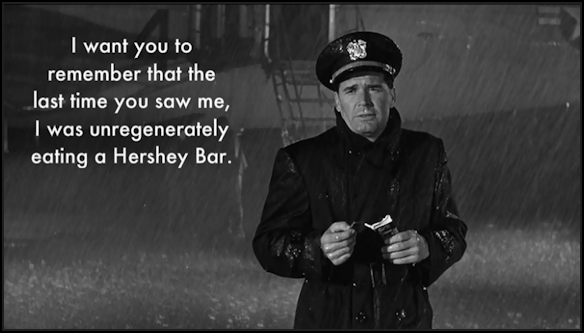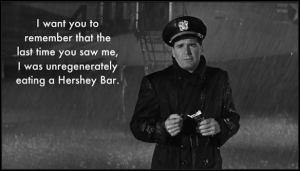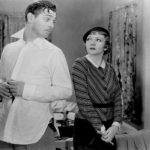The Americanization of Emily (1964)
Directed by Arthur Hiller
Lt. Cmdr. Charles E. Madison: War isn’t hell at all. It’s man at his best; the highest morality he’s capable of. It’s not war that’s insane, you see. It’s the morality of it. It’s not greed or ambition that makes war: it’s goodness. Wars are always fought for the best of reasons: for liberation or manifest destiny. Always against tyranny and always in the interest of humanity. So far this war, we’ve managed to butcher some ten million humans in the interest of humanity. Next war it seems we’ll have to destroy all of man in order to preserve his damn dignity. It’s not war that’s unnatural to us, it’s virtue. As long as valor remains a virtue, we shall have soldiers. So, I preach cowardice. Through cowardice, we shall all be saved.
The last movie my grandfather attended was Bugsy, which he walked out of because he couldn’t stand how much profanity was in it. His TV habits were short and simple. He watched sporting events and “The Rockford Files”. “I like it. You have a mystery, and a few jokes and then they have a car chase at the end, so you can have a little action.”
One morning, I was goofing around on his computer and listening to Howard Stern on his stereo. After awhile my grandfather came downstairs to walk on his treadmill. Eventually, I got up to go work out myself. I looked over at my grandfather, who was listening to the radio on a walkman, turned the stereo off and went to the club I belonged to.
When I got home, he was furious with me. “What the hell kind of show were you listening to? I’ve never heard such language in my life!” Trying desperately to figure out what had happened, I realized that he had probably turned the stereo back on after I left and sampled a little Howard. Now, I have no doubt that any fifteen minutes of the Howard Stern show would have infuriated my grandfather, but I soon realized that he had most likely sampled the fifteen minutes Howard Stern had spent that morning discussing his plans to “bitch-slap” “Rockford” star James Garner for slurring his name on “The Tonight Show”. Who else in the world could possibly have timing like me?
When Netflix had The Rockford Files streaming, I decided to watch every single one as a sort of tribute to him. He turned out to be right. Every single episode is exactly the same, but in a comforting enjoyable way. Poor Jim Rockford must have had at least 100 concussions from that series, because he was knocked unconscious by a duo (always a duo) in like 90% of the episodes. If you’re Jim Rockford and you see two guys in polyester suits walking towards your trailer, you need to get your gun out of the cookie jar and get yourself into your beige Pontiac Firebird as fast as you can.
After that I saw that you could buy Maverick episodes on Amazon, which was exciting because I’d only ever seen two in my life and loved them both. I watched every one of the episodes he made before he left over a contract dispute. They were all entertaining as hell.
Then I watched a bunch of YouTube interviews with him. He talked a lot about his first acting job, which was a non-speaking role in a Henry Fonda stage version of The Caine Mutiny Court Martial. So he basically got his education in acting from talking to Henry Fonda and watching him every night.
One thing that he said over and over again was that the work he was most proud of in his life was his role in the movie The Americanization of Emily. So as a final tribute to him, I decided to watch it tonight. It’s a black and white movie written by Paddy Chayefsky, who had written Marty and would go on to write Network. It costars Julie Andrews and she also seems to feel that it was the best movie she’d ever been in. It takes place in 1944 London, a few weeks before D-Day.
This would make a fascinating double feature with American Sniper. The script is really fantastic and legend has it that the original director assigned to the movie, William Wyler, was passed over because Chayefsky refused to have a word of it changed. The film reminds me a lot of two movies made about television A Face in the Crowd and Chayefsky’s Network. It’s an anti-war satire like Dr. Strangelove, but it isn’t played like farce. Chayefsky agrees that war is madness, but he goes so far as to maintain that no matter how virtuous a war may seem to be that it’s always a serious wrong.
Garner fits in perfectly. Like Rockford and Maverick, he is a wheeling dealing con man who proclaims himself with a sense of pride an outright coward. Another trait he shares with his television roles is that underneath it all he has a sense of moral principles that perhaps he doesn’t even understand.
Garner plays naval Commander Charlie Madison, who upon first hearing of the United States entering World War II turns down offers to sit through the war safely and entertainingly as a “Dog Robber,” which the movie tells us is essentially a personal assistant to a General or an Admiral. Instead he enlists in the marines as a private. After he gets his first taste of war, good men dying to prove their bravery and valor, he high tails it back to his Admiral friend armed with a new religion, cowardice.
We first see Charlie Madison spanking three women flirtatiously. He has enough charm to get away with it the first two times, but the third time he gets slapped, which is probably a decent enough probability to keep him doing it. The Admiral that he attends to gets the best of everything and as the man who makes that happen, Charlie is sitting out the rest of the war living high on the hog.
Julie Andrews is Emily, who lost her father, brother and husband to war. She is appalled at the opulence of the Americans while England is suffering from war rationing, and refuses Charlie’s gifts of Hershey bars feeling that if England is suffering that she should too. At first appalled by Madison’s disdain for honoring the dead brave soldiers of war, she falls for him and his philosophy enough to back Madison up at a point where he’s not even sure if he believes it any more.
When I saw the D-Day sequence in Saving Private Ryan, my first instinct was Jesus, I would have swum back the other way no matter how many miles it was back to England. I then read a book about how before D-Day the men were told to look at the man to their right and then to the man to their left. They were then told that of the three only one of them would survive the invasion, and yet those men, probably following a philosophy of man needing to prove themselves in war. They each felt bad for the other two guys.
To Madison, any war, no matter how just or moral, is merely a commercial for more wars, the world’s worst creation. In the course of a week Madison falls in love with Julie Andrews and winds up the first man to storm D-Day, a suicide mission that he wants no part of, but gets stuck with when the Admiral he serves has a schizophrenic episode and decides that he wants the majority of the PR from D-Day to go to the Navy. He wants the first man to die on the beach at Normandy to be a Navy man and he wants it to be filmed.
Madison actually winds up as the first man storming the beach only because the character played by a gung ho James Coburn is shooting at him so he can’t retreat. At first, it is thought that Madison died, and the entire world is anxious to make him one of the biggest war heroes of all time. No one has a problem with the fact that he was a coward through the entire affair. Somehow though he lives and that’s when his scruples kick in. He’d rather go to jail than promote the notion of wartime heroism, which is what he will get if he goes public with exactly how courageous he was on that day and the PR foolishness that preceded it. In the end, there is Julie Andrews to talk him out of it, by proving that such moral courage is exactly what Madison had been raging against for the entire war.
It’s a strange and cynical message.
Emily Barham: Then why do it?
Lt. Cmdr. Charles E. Madison: Because it’s the right thing to do.
Emily Barham: I can’t believe it. Is this the Charlie Madison who once said “God save us from all the people who do the right thing, it’s the rest of us who get our backs broken”?








